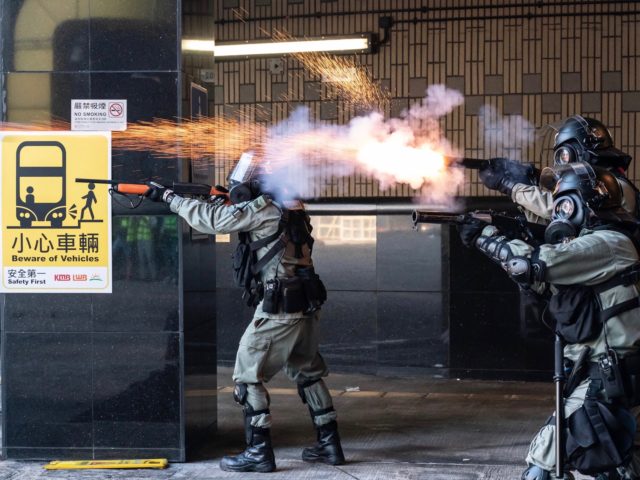British universities have been revealed to be posting advertisements for the Hong Kong Police Force, which critics claim has effectively become a tool forthe Chinese Communist Party to crush pro-democracy dissent in the former British colony.
Oxford University, alongside the universities of Bath, Leicester, Manchester, Warwick, and Exeter have all posted job advertisements for the Hong Kong Police Force (HKPF), despite widespread reports of brutality towards against pro-liberty activists.
The police force is currently being investigated by Britain’s all-party parliamentary group on Hong Kong, which is set to detail the “stunning array of abuses that are routinely enacted”, Baroness Bennett of Manor Castle, the group’s co-chairwoman, told The Times.
Baroness Bennett said that the university advertisements were “deeply disturbing”.
The adverts specifically targeted Hong Kong resident graduates with the chance to become probationary inspectors, as the force halted the hiring of foreign officers in 1994.
In response to the revelations about British universities, Kate Allen, the director of Amnesty International UK, said: “Promoting jobs with a police force responsible for cracking down on peaceful democracy protesters and for rounding up people under a draconian Beijing-imposed security law, links UK universities to human rights abuse in Hong Kong.”
“Universities are involved in promoting the values of open debate and free speech — both of which are increasingly under threat in Hong Kong,” Allen added.
Police brutality has become endemic since the start of the protest movement last year, with police seen using rubber bullets and even live rounds on activists, shooting a 14-year-old boy in October of last year.
The HKPF has also been accused of sexually assaulting female protesters.
Speaking to Breitbart London last year, a former member of the Hong Kong police condemned the violence committed by officers: “This is contrary to my training and my Western values. I would never use my baton or tear gas in such a way, and when people are vulnerable, when they have been arrested, we should not torture them. Their comfort and safety actually is our duty.”
Though the Hong Kong Police Force officially ceased hiring foreign officers in 1994, there are still several prominent British officers within the upper ranks of the force, holdovers from when it was the Royal Hong Kong Police Force under British rule.
Three key figures include chief superintendent Rupert Dover, senior superintendent David Jordan, and superintendent Justin Shave.
The three British men were all heavily criticised by Helen Goodman MP, who called on the British government to “throw the book” at them for their alleged involvement in ordering the use of rubber bullets and tear gas on the protesters.
In one infamous incident, Chief Superintendent Rupert Dover was allegedly seen ordering police to fire a round of tear gas at Wu Chi-wai, an unarmed Hong Kong legislator, for taking part in a pro-freedom protest.
Dover was later confronted by Joshua Wong, the former secretary-general of the now-defunct Hong Kong pro-democracy party “Demosistō”. The confrontation followed Wong’s release from prison, after he was jailed for his role in the Umbrella Movement protests in 2014.
“Rupert Dover, you are British, and you serve the interests of Beijing,” Mr Wong shouted at the senior officer.
Following the report by The Times, some of the universities have removed their advertisements for the Hong Kong Police.
Nottingham University — the first British university to establish a campus inside communist China — said that it removed the ads “in light of events in Hong Kong”.
There has been increased scrutiny on the ties between universities in the United Kingdom and the Chinese Communist Party (CCP) recently.
In May, King’s College London announced that it would be partnering with the Chinese tech firm Huawei, which has been described as “effectively state-owned“.
According to the think tank Onward, Chinese students represent over a quarter of all revenue collected through tuition fees at ten of Britain’s elite universities.
The think tank warned that the schools have a “worrying dependence” on China for their funding.
Follow Kurt on Twitter at @KurtZindulka

COMMENTS
Please let us know if you're having issues with commenting.